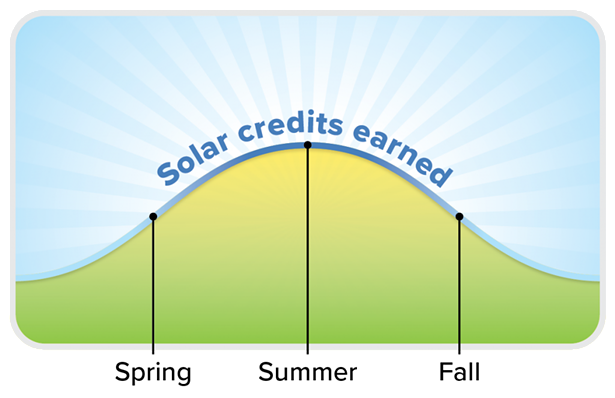A common myth about solar panels that home and business owners hear is that there’s no use going solar up north because there’s not enough sunlight. It’s true that in the higher latitudes of the US, like New York state, the days are pretty short for half the year, which in turn means not much solar production. But the flipside is that as short as those fall and winter days are, they’re that much longer in the spring and summer. In fact, for many days of the year, New York homes and businesses receive far more sunlight than they need for their daily energy needs.
Now, if only there was a way to capture that extra sunlight for the darker months. It turns out there is! Utility companies in New York are required to compensate customers for all solar energy they produce while tied into the utility grid. This system of compensation is called net metering, and it helps make solar work financially for many home and business owners.
How Does Net Metering Work?
Say, for example, that on a particularly sunny spring day, solar panels produce more energy than a household can use in 24 hours. All that extra electricity gets fed back into the grid, and the utility company tracks it and credits it to the homeowner’s account. At the end of a billing cycle in which a household generated more power than they used, that electric bill will effectively be zero and the monthly statement should show a balance of banked solar credits. That means that at the end of the summer, their account will have tons of solar credits because of all those long sunny days where their panels made more energy than they used.
Later in the year when the days get short again, their solar home will start to use more energy than their panels can generate. This is when their banked credits become useful. At the end of their billing cycle, instead of being charged for energy used from the grid, the utility company will just subtract from the banked credits, once again effectively zeroing out the bill.
Figuring out just how many solar panels a home or business needs to zero out their bills over the course of a year is a challenge, but that’s where a friendly local solar company steps in. Kingston-based SunCommon was recently designated a NYSERDA Platinum Quality Installer. Their team of experts has designed and installed over 10,000 solar systems for homes, farms, and businesses across New York and Vermont, and they're ready to help local home and business owners save money, no matter the season. To learn more, visit SunCommon.com.
















